A positive mealtime environment in your early years setting provides opportunities for children to learn about food and the importance of making nutritious choices.
The revised Early Years Foundation Stage framework (opens in new tab) learning and development requirements, emphasise the importance of supporting children to learn how to look after their bodies, including how to make healthy choices in relation to food, and mealtimes are a great way to achieve this!
We’ve pulled together our top tips on how you can create a positive and enjoyable mealtime experience for children.
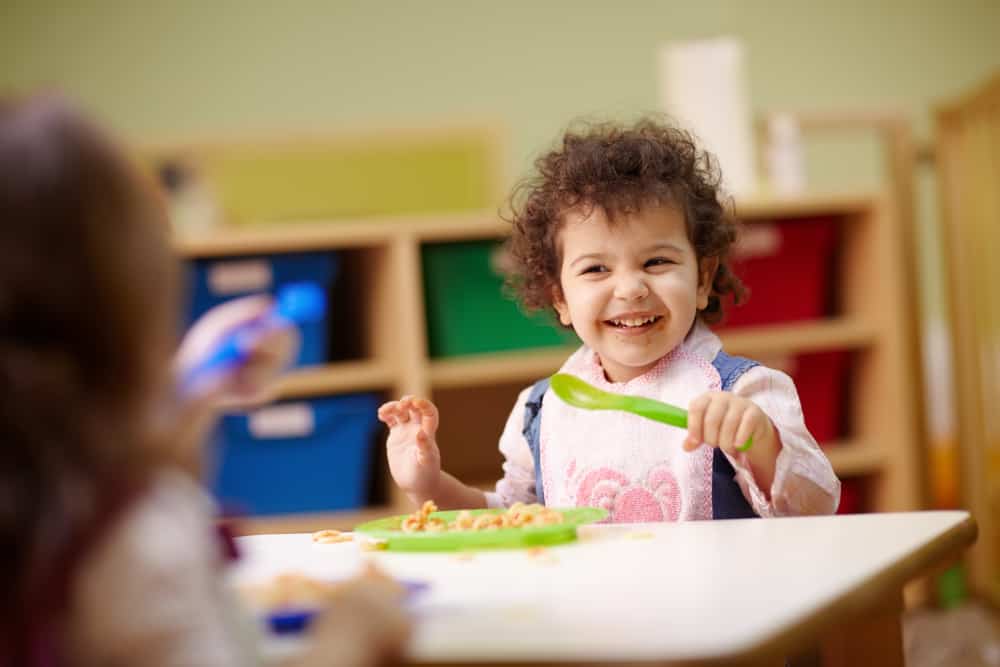
Atmosphere
- Ensure the environment is clean, bright and free from distractions
- Tables- use wipe-able tablecloths or placemats to make your tables more appealing. Ensure tables and chairs are suitable for the age and size of the children e.g. appropriate high chairs
- Crockery– use child friendly equipment e.g. plastic bowls and plates, and plastic/rubber spoons, knives and forks
- Staff– sitting and eating with the children is an opportunity for positive role modelling, and engaging them in conversation.
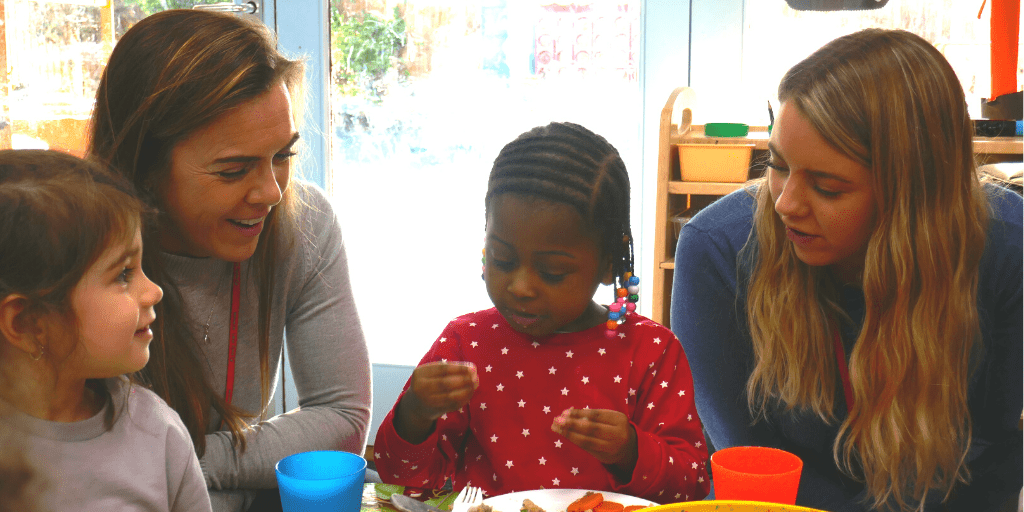
Conversation at mealtimes
Mealtimes are also a great opportunity to talk to children about food and what they’re eating. This is a great time to discuss healthy eating and how to keep ourselves healthy.
You can get more guidance on supporting children to learn about food in our Cooking and Learning about Food training (opens in new tab).
Encourage conversation at mealtimes, by taking about:
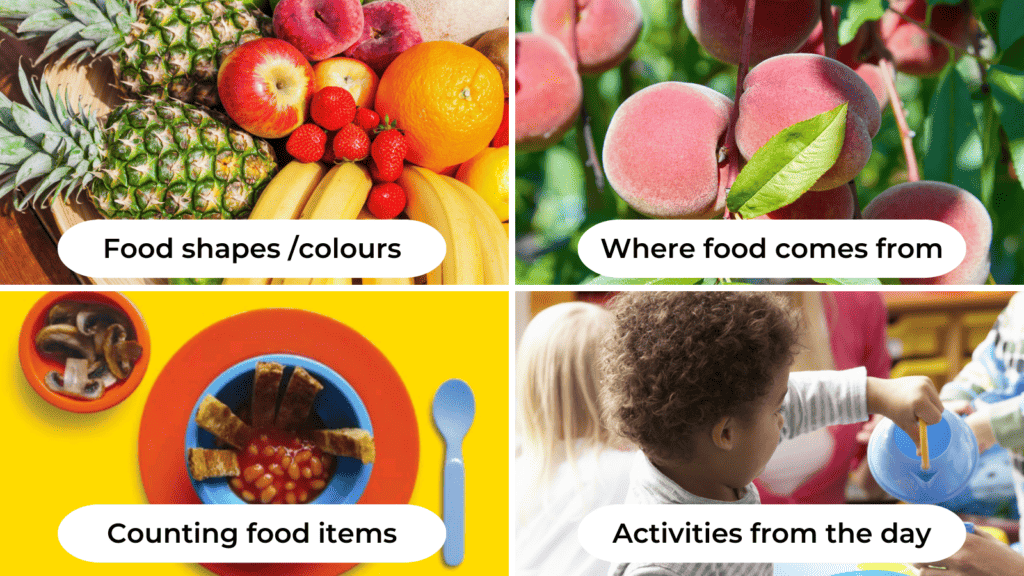
Routine
As outlined in the Eat Better Start Better Guidelines (PDF, 5.2MB), it’s important to consider the timings of your meals and snacks. Remember that children need to eat regularly, so meal and snack times should be sensibly spread throughout the day. This ensures that children don’t have long periods of the day without food, but also ensures that meals are not too close together. Offering meals and snacks at similar times each day helps children to get into a routine and manage their appetite.
Allow enough time for children to eat as much as they need, without feeling rushed or losing interest. Of course, some children may take a little longer than others, so it’s important to recognise their individual needs. Here are our top tips for your early years setting mealtime routine:
- Offer three meals (breakfast, lunch & tea) and two snacks- morning & afternoon
- Offer pudding with both lunch and tea time meals
- Ensure water is available at all meal and snack times (and across the day)
- Leave no more than a three hour gap between meals and snacks, but avoid offering them too close together
- Mealtimes should last around 30 minutes, so that children have enough time to eat, without feeling rushed
- Have set meal and snack times to help children get into a routine.

Eating Well at Mealtimes
There are lots of ways to encourage children to get involved at mealtimes, and this can help to support their learning and encourage independence. Let’s take a look at some ideas:
- Involve children in setting up the tables before mealtimes, e.g. putting cups, plates and cutlery on the table
- Consider how food is served. For example, can you put one large dish on each table and encourage children to serve themselves (with support). Can you provide a jug of water and cups, so that children can pour their own drink?
- Consider if there are elements of meals and snacks that children can help prepare themselves, such as spreading cream cheese on crackers and chopping soft fruit (with children friendly knives)
- Encourage children to feed themselves (with support where necessary), as this is a great opportunity for them to practice using cutlery, and it can help to support school readiness
- Involve children in tidying up, for example scrapping their plates into the bin, putting cutlery in a washing bowl, sweeping the floors etc.
- If you’d like more information on planning rolling snacks in your setting, take a look at our blog Snack time in your Early Years Setting (opens in new tab).
Please Note: As outlined in the EYFS providers must ensure that children are adequately supervised, including whilst eating.
Ref: “Staff: child ratios” (3.29), whilst eating, children must be within sight and hearing of a member of staff.

Encouraging Fussy Eaters to Eat Well
- Young children can be fussy about what they eat, or how they eat
- There’s lots you can do you in your setting to support children who are fussy with food, and it’s important that your approach is consistent and all those involved in mealtimes follow the same strategies
- For more guidance on supporting children you are fussy or picky at mealtimes, complete our Fussy Eating (opens in new tab) training or signpost parents to our free course Fussy Eating Strategies for Families (opens in new tab).
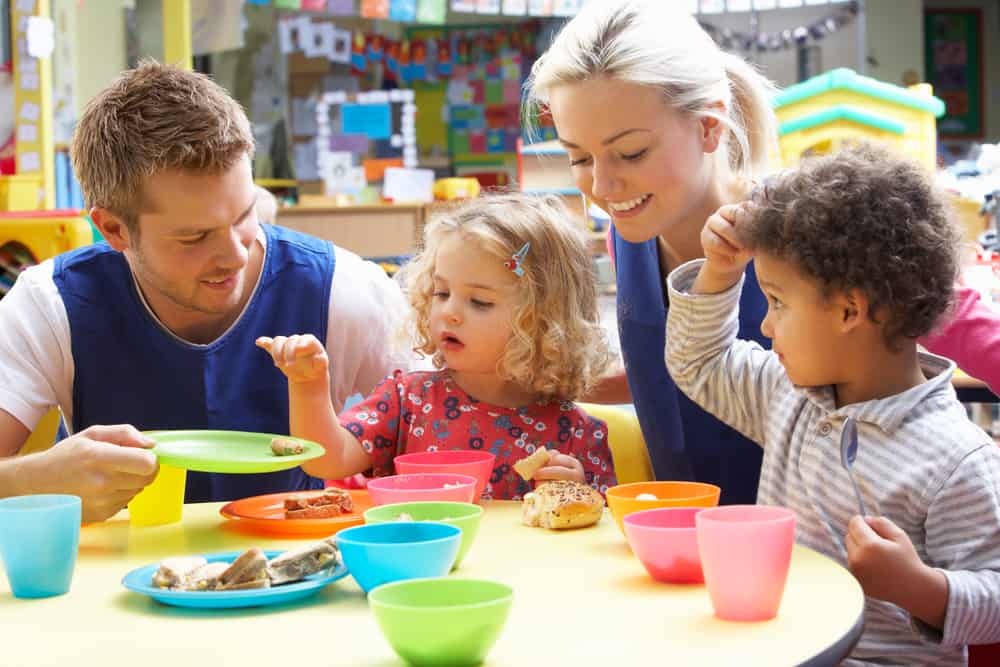
Resource
You may find our Mealtime Checklist useful when reviewing your mealtime environment.
Download our Mealtime Environment Checklist for Early Years Settings, here (PDF, 2MB).
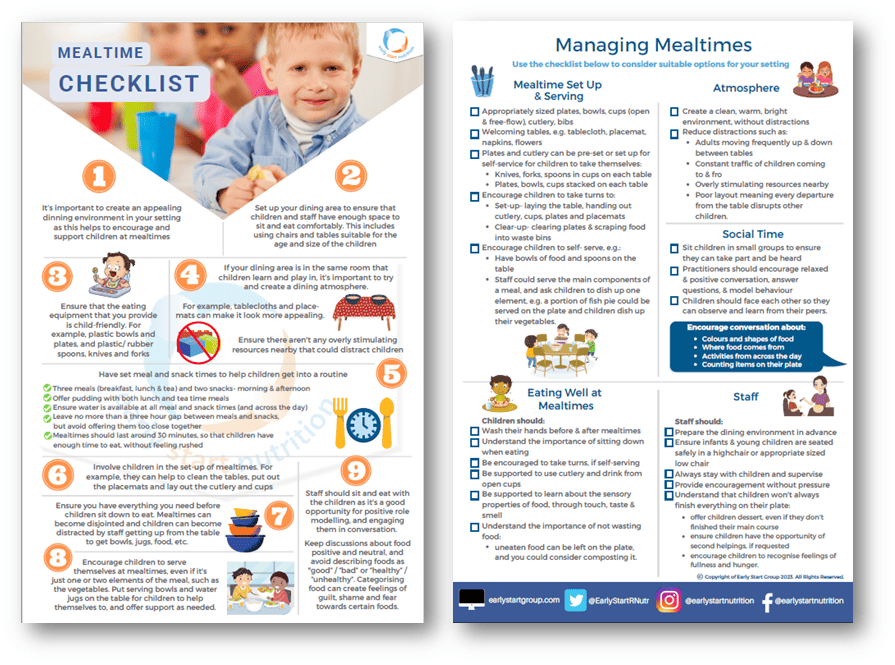
If you’d like support with your mealtime environment contact the team (opens in new tab) to arrange a virtual call or visit to your setting.

[…] is essential when dealing with fussy eaters. Establishing clear mealtime rules and routines may make your kid feel more structured and predictable, making it easier for them to try new […]
[…] is essential when dealing with fussy eaters. Establishing clear mealtime rules and routines may make your kid feel more structured and predictable, making it easier for them to try new […]